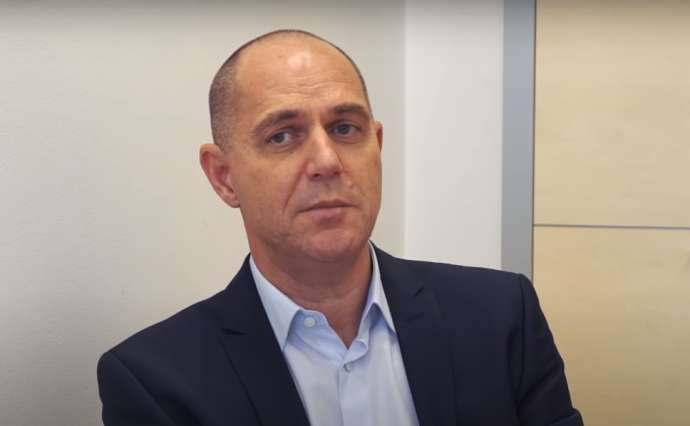STA, 7 October 2020 - The leaders of the four centre-left opposition parties have confirmed they have launched talks to form an alternative to the Janez Janša government based on an initiative led by economist Jože P. Damijan, who is willing to become prime minister.
Marjan Šarec, the former prime minister and leader of the LMŠ party, told reporters on Wednesday that the basis for talks was the Constitutional Arch Coalition initiative presented by Damijan.
The LMŠ, Social Democrats (SD), Left and the Alenka Bratušek Party (SAB) deem the manifesto presented by Damijan acceptable because it contains points from their own platforms, which makes it a good basis for talks.
Šarec said they wanted to lead talks away from cameras and microphones. As for support to Damijan, he said nobody was bothered by him "but at this point we can't say we've reached common ground on everything already".
Despite differences of opinion in the past, SD leader Tanja Fajon said the four parties wanted a better country in which there would be more respect for democracy, independence of regulators, media, the constitution and laws. Asked about support to Damijan, she said everyone agreed in this initial phase that this was a good basis for further talks.
"Our country is being captured under the pretext of coronavirus. There's no time to wait for elections, an alternative must be formed here and now," said the leader of the Left Luka Mesec. He said Damijan was an appropriate candidate, and that if an agreement was reached, he would get the Left's support.
Alenka Bratušek said her party had committed to do everything in its power to re-establish a centre-left government, asserting that she believed "we are capable of agreeing on what needs to be done", and on staffing. But she said the programme must be agreed on first, only then came staffing decisions. She said whoever would get the most votes would be the new prime minister.
The four parties have a combined 39 seats in the 90-strong National Assembly, so they will also invite the coalition Modern Centre Party (SMC) and Pensioners' Party (DeSUS) to join the talks, to "give them an opportunity to jump off the train of madness that is hurtling into ruin", as Bratušek put it.
However, the two junior coalition parties do not seem impressed by the initiative, with SMC head Zdravko Počivalšek and interim DeSUS leader Tomaž Gantar rejecting it downright.
According to Počivalšek, leading a government "takes courage, going to the election, getting a mandate and executing what you plan". "But at this moment there is no alternative to this government," he told the STA.
Gantar said the matter did not warrant a commentary, arguing similar proposals have become a regular occurrence in the media. He has so far not heard of a good alternative to the current government, which he feels is doing a good job.
Gantar said the information that Karl Erjavec will attempt a comeback to the helm of the party would not affect DeSUS's position in the government. He said Erjavec had made no mention of not being able to work with Janša.
Matej Tonin meanwhile said New Slovenia (NSi) was interested in the platform of the initiative and the number of votes it would have in parliament. He told the STA the NSi was a party of dialogue and was ready to talk. But the NSi has not been invited to talks, he said on Facebook.
"I assess Slovenia needs a stable and homogeneous government in these crucial moments. The last thing we can afford in this situation is a political crisis and experimenting with some kind of transitional government," Tonin wrote.
Janša responded to the initiative by tweeting that "naming a small group of left and far-left parties and tiny parties a constitutional arch means to ridicule both the Slovenian language and Slovenia's constitutional order". "By definition a constitutional arch requires the representation of at least two-thirds of the electorate," he added.
The manifesto of the Constitutional Arch Coalition sets out as priorities an effective response to the coronavirus crisis in healthcare; infrastructure for a kind future; modern infrastructure, science and culture; a green and digital transformation and stimulating technological development and the marketing of breakthrough ideas.
As an effective response to the health crisis the manifesto calls for an immediate creation of regional centres to treat Covid-19 patients, and a plan to reduce waiting times. Health funding is to be increased by 1% of GDP in 2021 and by 3% of GDP by 2025.
To increase social security, the manifesto proposes introducing a minimum universal income and incorporating top-up health insurance in mandatory contributions by raising contribution rates.
Higher contribution rates would also fund a system of long-term care, while a demographic fund would help fund the burden of demographic transition.
The manifesto also promises affordable housing for young people and new capacities for elderly in care homes and sheltered apartments, which would be funded by transforming part of the Bank Assets Management Company into a housing fund.
The document also lists free pre-school care and education for all children, regulation of flexible forms of employment and distance jobs with full social security for all forms of work.
To fund the construction and renovation of the rail network, new schools and hospitals, the manifesto proposes to create an investment fund by issuing 30-year infrastructure bonds on the domestic market.
The manifesto also proposes for budget funding of research and development to be raised to 1% of GDP by 2025 and increasing culture funds by 20%.






